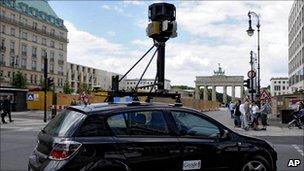Wary Germans say no to Google cameras
- Published

Google's cameras have not had an easy ride down German streets
When is your home private and when is it part of the public landscape? If someone comes along and takes a picture of the front of your house, are they intruding on your privacy?
If you've left the curtains open and they capture the inside of your front room, is that an intrusion? What if it were a company that took a picture of your house - or a government?
All these questions have been bothering Germans since Google announced that its Street View cars with 360-degree cameras on top would be trundling through the country's 20 biggest cities and putting the images on the web for all to see.
Countries from Australia to the United States have participated with barely a murmur, but in Germany there was an outcry louder than anywhere else on the planet.
It was so loud that Google was forced to bow to the pressure and give homeowners and tenants the right to opt out even before the pictures had been posted on the web.
Now the federal government is talking to Google to try to find a middle way that keeps privacy for those who want it while not stopping the Street View vehicles in their tracks and blocking the whole project.
It is, though, a daunting challenge. The magazine Spiegel reported over the weekend that hundreds of thousands of people had registered their objection to their homes appearing. Google wants Street View up and running by the end of the year, but the torrent of opposition presents it with the mundane but time-consuming task of pixellating out numerous properties.
Google has clearly met a conservative force unlike any other. This is the country which has yet to embrace the credit card with anything like the appetite of the British or Americans.
Germans do not have a fervour for what Americans or the British think is simply the modern way of doing things. Sunday trading? Forget it.
No revolutionaries
There is a paradox in the German way of business. It has awesome methods of efficient and intelligent production. It makes the things the world wants at prices the world is ready to pay. Germany exports like no other country, not even China.
Germans experienced government misuse of information under both Nazism and Communism
But that does not mean it is very good at spotting the new technologies that revolutionise economies.
"Germany has excellent technology for building engines, for example, but it's not a revolution - it's about improving existing knowledge," Prof Nicolas Apostolopoulos from the Centre for Digital Systems at the Free University in Berlin told the 91热爆.
"Only a few German companies have created innovations that are completely new."
Prof Apostolopoulos says people in Britain or the United States tend to see the possibilities of new technology, while Germans tend to see the dangers.
This conservatism serves Germany well when it comes to traditional industries but badly with the new technologies - like Google Street View.
So when the new technology is about information, the fears of Germans are heightened - for obvious reasons in a country with the experience of 60 years of horrific governmental misuse of information under the Nazis and then the Communists.
This mistrust meant that right back at the dawn of the internet age in the 1980s, when it had barely made an impression on the public consciousness, Germany started passing data protection laws.
New technologies often dent old laws. In 1890, the advent of the camera, for example, combined with cheap newspapers prompted American lawmakers to come up with a "right to privacy".
The internet plus Google Street View have sparked a similar debate. A postcard picture of a town and its houses, for example, seems very different from putting the same view on the web for the world to pore over - or it seems very different to many Germans.
So Google's cameras were never going to get an easy ride down German streets. These fears were compounded when, earlier in the year, the company admitted that its Street View cameras had (inadvertently, according to Google) collected snippets of information from home wi-fi networks which weren't protected by passwords.
This ultra-wariness has its benefits, of course. Germany doesn't go in for great revolutions in the way it conducts business - which meant that much of the financial innovation in Europe happened in the City of London and not in Frankfurt.
In Germany, they are not too worried about that these days, given the carnage in the financial system that followed. There is a downside to innovation, too.
- Published15 September 2010
- Published17 August 2010
- Published22 June 2010
- Published28 May 2010